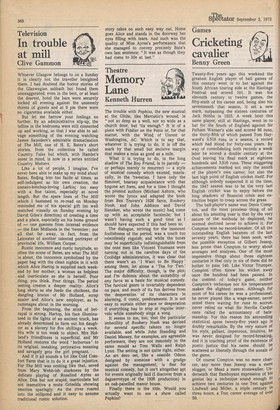Television
In trouble at mill
Clive Gammon
Whoever Glasgow belongs to on a Sunday it is clearly not the traveller benighted there. I had doubted the horror stories of the Glaswegian sabbath but found them unexaggerated: even in the best, or at least the dearest, hotel the bars were securely locked all evening against the unseemly thirsts of guests and at 9 pm there were no cigarettes available either.
But let me harrow your feelings no further. By an administrative slip-up, the tellies in the bedrooms were still connected up and working, so that I was able to salvage something of the evening watching James Saunders's admirable dramatisation of The Mill, one of H. E. Bates's short stories, from the collection he called Country Tales but which, with Hamlet's sneer in mind, is now in a series entitled Country Matters.
Like a lot of people, I imagine, I've never been able to make up my mind about Bates, finding him too facile at times, as self-indulgent as his own creation, the tomato-ketchup-loving Larkin; too easy with a fine talent, especially at novel length. But the spare lines of The Mill which I hastened to re-read on Monday reminded me of his special gift (so well matched visually on Sunday evening by David Giles's direction) of creating a time and a place, especially on his home ground of — one guesses from internal evidence • — the East Midlands in the 'twenties : not all that far away, in fact, from the Leicester of another talented portrayer of provincial life, William Cooper.
Rustic innocence and rustic turpitude, so often the scene of Bates, are what The Mill is about, the innocence symbolised by the paper bag with the clean nightie in it with which Alice Hartop is supplied each weekend by her mother, a woman as helpless and inarticulate as she is herself. Poor thing, you think. Poor things. The period setting creates a deeper reality: Alice's long skirts as she feeds the chickens, the dangling braces of Mr Holland, scrap aealer and Alice's new employer, as tit rummages about in the morning.
From the beginning, the stink of betrayal is strong. Hartop, his face illumineteed in the lights of an ancient truck, has already determined to farm out his daughter as a slavery for five shillings a week. His wife is too weak to object. Mrs Holland's friendliness is superficial, and Mr Holland restores the word ' lecherous ' to its original, sneaking, perjorative meaning and savagely gets the girl pregnant.
And if it all sounds a bit like Cold Comfort Farm that is to do it a great injustice. For The Mill was nothing like that, saved from Mary Webb-ish starkness by the delicate playing of Rosalind Ayres as Alice. Dim but not stupid, inarticulate but not insensitive a mute Griselda showing emotion sparingly. As the river roared into the millpond and it easy to assume traditional rustic solution. story takes no such easy way out. Home goes Alice and stands in the doorway her eyes filling with tears. And such was the quality of Miss Ayres's performance that she managed to convey precisely Bate's own last sentence: "It was as though they had come to life at last."






































 Previous page
Previous page